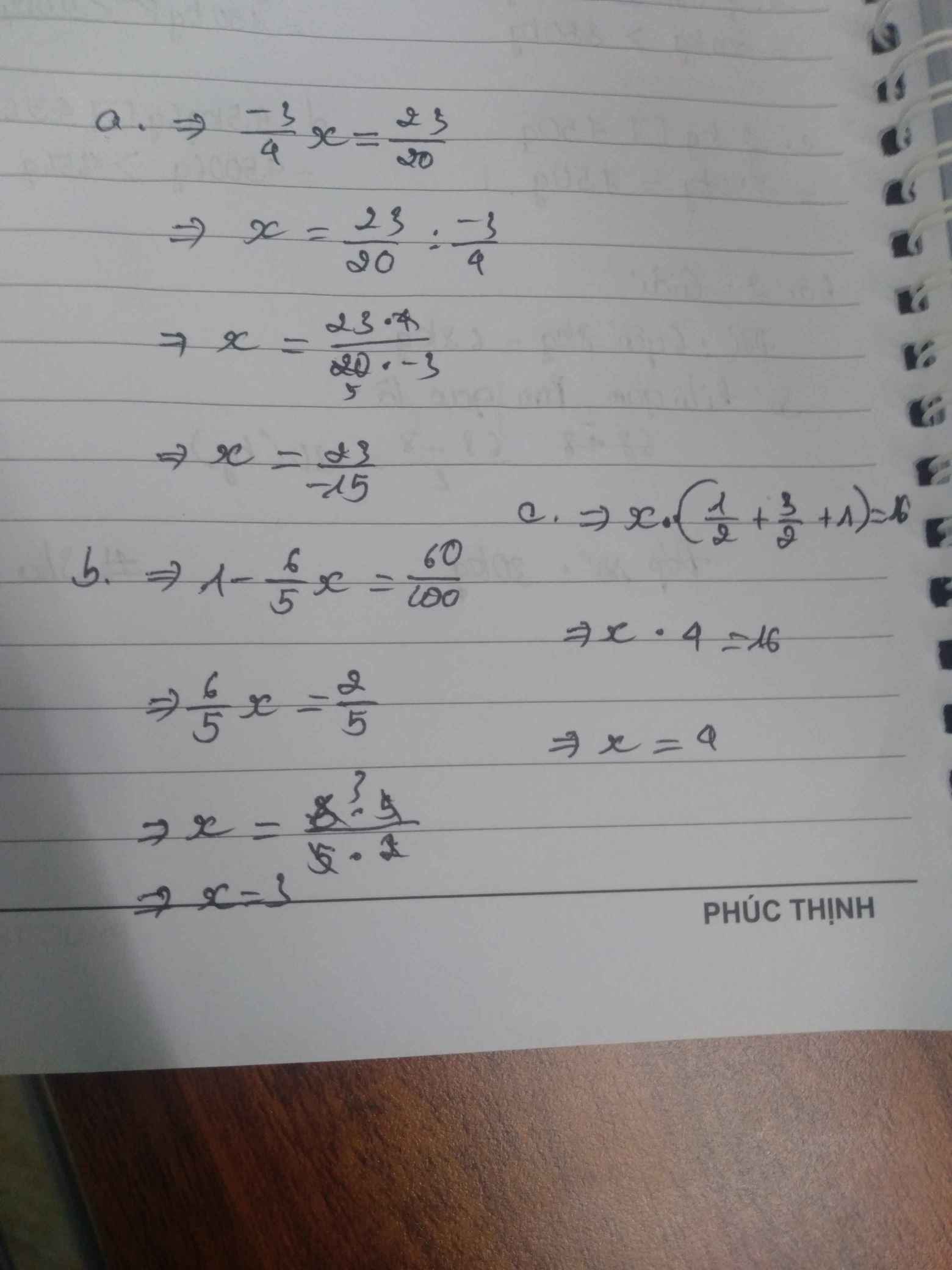
Hãy nhập câu hỏi của bạn vào đây, nếu là tài khoản VIP, bạn sẽ được ưu tiên trả lời.


1
\(\left(x-2\right):2.3=6\)
\(\Leftrightarrow\left(x-2\right):2=2\)
\(\Leftrightarrow\left(x-2\right)=4\)
\(\Leftrightarrow x=4+2=6\)
c) ta có
\(\left[\left(2x+1\right)+1\right]m:2=625\)
\(\Leftrightarrow\left[\left(2x+1\right)+1\right]\left\{\left[\left(2x+1\right)-1\right]:2+1\right\}=1250\)
\(\Leftrightarrow\left(2x+1\right)^2+1-1:2+1=1250\)
\(\Leftrightarrow\left(2x+1\right)^2+1-2+1=1250\)
\(\Leftrightarrow\left(2x+1\right)^2+1-2=1249\)
\(\Leftrightarrow\left(2x+1\right)^2+1=1251\)
\(\Leftrightarrow\left(2x+1\right)^2=1250\)
...
2
\(\left(x-\frac{1}{2}\right).\frac{5}{3}=\frac{7}{4}-\frac{1}{2}\)
\(\Leftrightarrow\left(x-\frac{1}{2}\right).\frac{5}{3}=\frac{5}{4}\)
\(\Leftrightarrow\left(x-\frac{1}{2}\right)=\frac{5}{4}:\frac{5}{3}\)
\(\Leftrightarrow\left(x-\frac{1}{2}\right)=\frac{5}{4}.\frac{3}{5}\)
\(\Leftrightarrow x-\frac{1}{2}=\frac{3}{4}\)
\(\Leftrightarrow x=\frac{3}{4}+\frac{1}{2}=\frac{5}{4}\)

a. x:(1/2+2/3)=6/5
=>x:7/6=6/5
=>x=6/5*7/6=>x=7/5
b.(x-1/2)-5(x-2/3)=3/2x
=>x-1/2-5x+10/3=3/2x
=>-4x+17/6=3/2x
=>17/6x=3/2x--4x
=>17/6=x(3/2+4)=>17/6=11/2x=>x=17/33
c.-5(x+1/5)-1/2(x-2/3)=x
=>-5x-1-1/2x+1/3=x=>-11/2x-2/3=x
=>-2/3=x+11/2x=>-2/3=x(1+11/2)=>-2/3=13/2x
=>x=-4/39
a) x : (1/2 + 2/3) = 6/5
=> x : 7/6 = 6/5
=> x = 6/5 x 7/6
x = 7/5
b) , c) ko bít hihi

Câu 6: Khôg có cau nào đúng
Câu 7: C
Câu 8: B
Câu 9: B
Câu 10: D

Bài 1:
a) \(\dfrac{9}{20}-\dfrac{8}{15}\times\dfrac{5}{12}\)
\(=\dfrac{9}{20}-\dfrac{2}{9}\)
\(=\dfrac{41}{180}\)
b) \(\dfrac{2}{3}\div\dfrac{4}{5}\div\dfrac{7}{12}\)
\(=\dfrac{2}{3}\times\dfrac{5}{4}\times\dfrac{12}{7}\)
\(=\dfrac{5}{6}\times\dfrac{12}{7}\)
\(=\dfrac{10}{7}\)
c) \(\dfrac{7}{9}\times\dfrac{1}{3}+\dfrac{7}{9}\times\dfrac{2}{3}\)
\(=\dfrac{7}{9}\times\left(\dfrac{1}{3}+\dfrac{2}{3}\right)\)
\(=\dfrac{7}{9}\times1\)
\(=\dfrac{7}{9}\)
Bài 2:
a) \(2\times\left(x-1\right)=4026\)
\(\left(x-1\right)=4026\div2\)
\(x-1=2013\)
\(x=2014\)
Vậy: \(x=2014\)
b) \(x\times3,7+6,3\times x=320\)
\(x\times\left(3,7+6,3\right)=320\)
\(x\times10=320\)
\(x=320\div10\)
\(x=32\)
Vậy: \(x=32\)
c) \(0,25\times3< 3< 1,02\)
\(\Leftrightarrow0,75< 3< 1,02\) ( S )
=> \(0,75< 1,02< 3\)

a: 2x(x+1)-135=-200
=>2(x^2+x)=-65
=>2x^2+2x+65=0
=>x^2+x+32,5=0
=>x^2+x+0,25+32,25=0
=>(x+0,5)^2+32,25=0(vô lý)
b: 4x-5(x-1)+15=13
=>4x-5x+5=-2
=>5-x=-2
=>x=5+2=7
c: 2/3x-1/4=3/5-7/8
=>2/3x=3/5-7/8+1/4=24/40-35/40+10/40=-1/40
=>x=-1/40:2/3=-1/40*3/2=-3/80
d: 1/2(2x-3)+105/2=-137/2
=>1/2(2x-3)=-137/2-105/2=-242/2=-121
=>2x-3=-242
=>2x=-239
=>x=-239/2

\(a)x=\dfrac{1}{4}+\dfrac{5}{13}=\dfrac{33}{52}.\\ b)\dfrac{x}{3}=\dfrac{2}{3}+\dfrac{-1}{7}.\\ \Leftrightarrow\dfrac{x}{3}=\dfrac{11}{21}.\\ \Leftrightarrow\dfrac{7x}{21}=\dfrac{11}{21}.\\ \Rightarrow7x=11.\\ \Leftrightarrow x=\dfrac{11}{7}.\\ c)\dfrac{x}{3}=\dfrac{16}{24}+\dfrac{24}{36}=\dfrac{2}{3}+\dfrac{2}{3}=\dfrac{4}{3}.\\ \Rightarrow x=4.\\ d)\dfrac{x}{15}=\dfrac{1}{5}+\dfrac{2}{3}=\dfrac{13}{15}.\\ \Rightarrow x=13.\)
